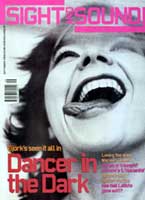Primary navigation

USA 1999
Reviewed by Fiona Morrow
Our synopses give away the plot in full, including surprise twists.
A longterm fan of the sport, Barry W. Blaustein sets off to make a documentary about wrestling. He meets Vince McMahon, head of the World Wrestling Federation (WWF), who's about to start a marketing campaign for a new wrestler, Darren Drozdov. He visits Roland Alexander, an amateur promoter, and meets his most promising competitors, Tony Jones and Mike Modest, before arranging a try-out at the WWF for them.
Blaustein meets veteran wrestler Terry Funk. He accompanies Terry to the first pay-per-view event of the Extreme Championship Wrestling (ECW). The organisation is run from the basement of founder Paul Heyman and prides itself on its violent approach. Funk wrestles; his family look on in tears as he becomes bloodied. Blaustein meets the wrestler, Mick Foley, and we see home-movie footage of him as a teenager throwing himself from the roof of the family home. Blaustein then meets Jake Roberts, a famous wrestler whose career has been destroyed by his various addictions. Terry Funk retires. When shown footage of his wife and children upset at his violent bout with Rocky Maivia, Foley questions his actions. Blaustein meets New Jack, a wrestler with convictions for four justifiable homicides, who would like to become an actor. Blaustein arranges for him to meet with a casting agent. We learn that Funk is fighting again, Roberts has been taken to court for non-payment of child support and neither Jones or Modest were taken on by the WWF. We also learn that Drozdov was paralysed during his debut match.
Better known as the scriptwriter of the Eddie Murphy vehicle The Nutty Professor, Barry W. Blaustein makes his directorial debut with this documentary on wrestling, a sport which has entranced him since childhood. Luckily for him, he makes contact with a number of complex, intriguing men, happy to talk about their lives on camera. Lucky, because Blaustein hasn't an idea how to structure a narrative, seemingly believing that documentary film-making means presenting events in the order in which they were filmed. Consequently, we are left with a thematic jumble as Blaustein drives between various states visiting people apparently at random. He also directly intervenes in the lives of those he is filming: he sets up a try-out for two amateur wrestlers with the World Wrestling Federation, arranges a casting session for a wrestler with ambitions to act and shows Mike Foley the footage he has shot of the wrestler's family deeply distressed while watching him fight.
But despite breaking some of the unwritten (and admittedly malleable) laws of documentary here, Blaustein's film is less a provocative engagement with established forms of non-fiction film as a home movie, albeit one that's been bankrolled by Universal Studios. You're left with the impression Blaustein wanted to make personal connections with the wrestlers as much as he wanted to direct a documentary. His scene with Foley owes less to the sequence in the Maysles brothers' record of the Altamont pop festival Gimme Shelter (1970), where Mick Jagger was filmed watching the footage of the fatal stabbing that occurred during the concert, than it does to Blaustein's need to be seen to care.
Blaustein was clearly surprised at what he found and struggles to adapt to the reality of physical injury, addiction and exploitation in the world of professional wrestling. At least he has the good sense to keep his camera running, for amid the structural mayhem there is something moving, challenging and surprising about these men's lives. During the scenes where Jake Roberts meets his estranged daughter, then talks about his abusive upbringing and the lonely, soulless life of a showman in decline, we find ourselves in the heart of something cruel and compelling.
Unfortunately Blaustein isn't an experienced enough film-maker to make much of such material. A more insightful approach to the subject can be found in Kim Longinotto's forthcoming television documentary Gaea Girls, a film about women wrestlers in Japan.